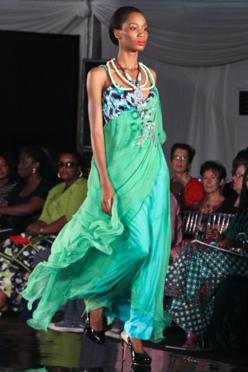By: Musleehat Hamadu
Main Photo Credit: Cote Minou Collections
Pictured: Anita Quansah London for Eki Orleans at Arise Magazine Fashion Week 2011.
 Right from childhood in Nigeria, all my traditional outfits were custom-made by a seamstress. My mom would take my siblings and I to the shop or the seamstress would come to our house and take our measurements. Once the outfits were ready, we would try them on and then the seamstress would take them back to make adjustments if necessary. Even now, all the traditional wears I have are custom-made. While a few were made here in the States, the bulk was made in Ghana and Nigeria.
Right from childhood in Nigeria, all my traditional outfits were custom-made by a seamstress. My mom would take my siblings and I to the shop or the seamstress would come to our house and take our measurements. Once the outfits were ready, we would try them on and then the seamstress would take them back to make adjustments if necessary. Even now, all the traditional wears I have are custom-made. While a few were made here in the States, the bulk was made in Ghana and Nigeria.
Custom-made or Haute Couture traditional attire has been the norm in African countries, but nowadays many designers are producing Ready to Wear (RTW) clothes out of traditional African fabrics.
Over the past few years, African fashion has taken off as many designers have reworked Ankara, batik, and other African prints into more contemporary, Ready to Wear styles. We’ve seen American celebrities like Rihanna, Kelis, and Erykah Badu rocking African fashion labels like Suno, Zed Eye, and Jewel by Lisa. UK’s largest online retail store, ASOS.com, has a line called ASOS Africa with dresses, skirts and tops made out of Kitenge prints from Tanzania.
The 2011 Spring Collection of Gwen Stefani’s fashion line L.A.M.B. was full of dresses, skirts, pants, and tailored suits made out of Ankara. And earlier this month, Arise magazine held its 3rd Annual Fashion Week (AMFW) in Lagos, Nigeria featuring over 50 African labels.
As African fashion is becoming a global phenomenon, there are many questions I think we Africans must consider regarding the future of our fashion. How does the globalization of African fashion affect the continent of Africa? How can we ensure the sustainability of African fashion labels? How will the influx of RTW designers affect local tailors both in the continent and abroad? While these RTW labels may garner success outside of the continent, how will they fare against the cheaper custom-made styles provided by local tailors within the Continent? How will we use the globalization of African fashion to uplift the image of our continent?
This is open for discussion.










